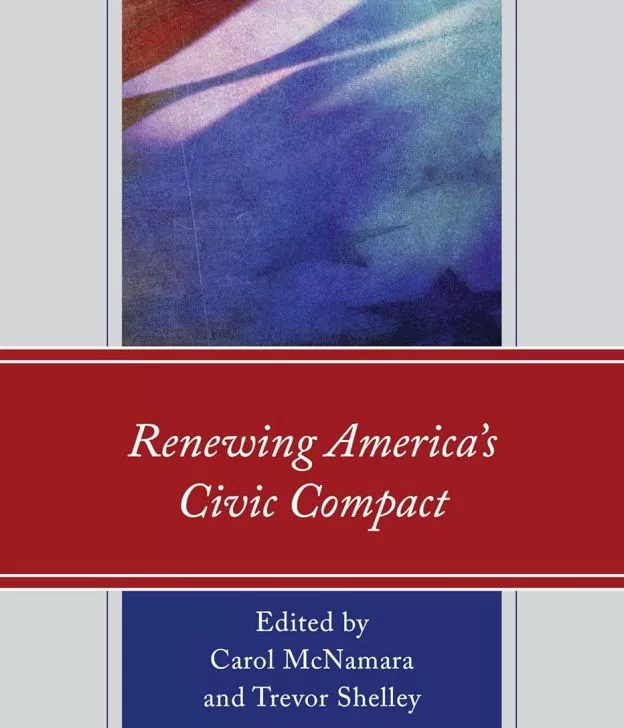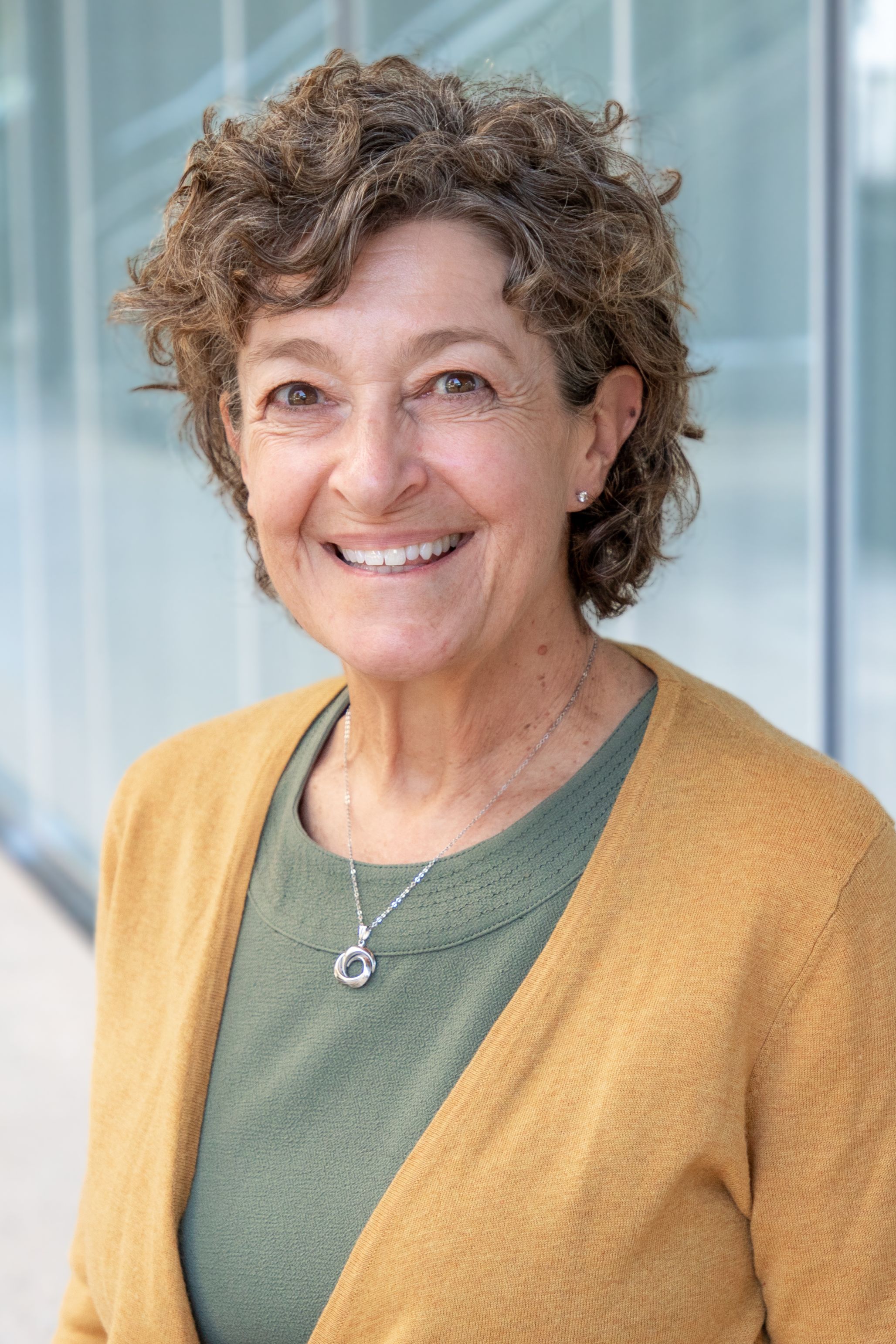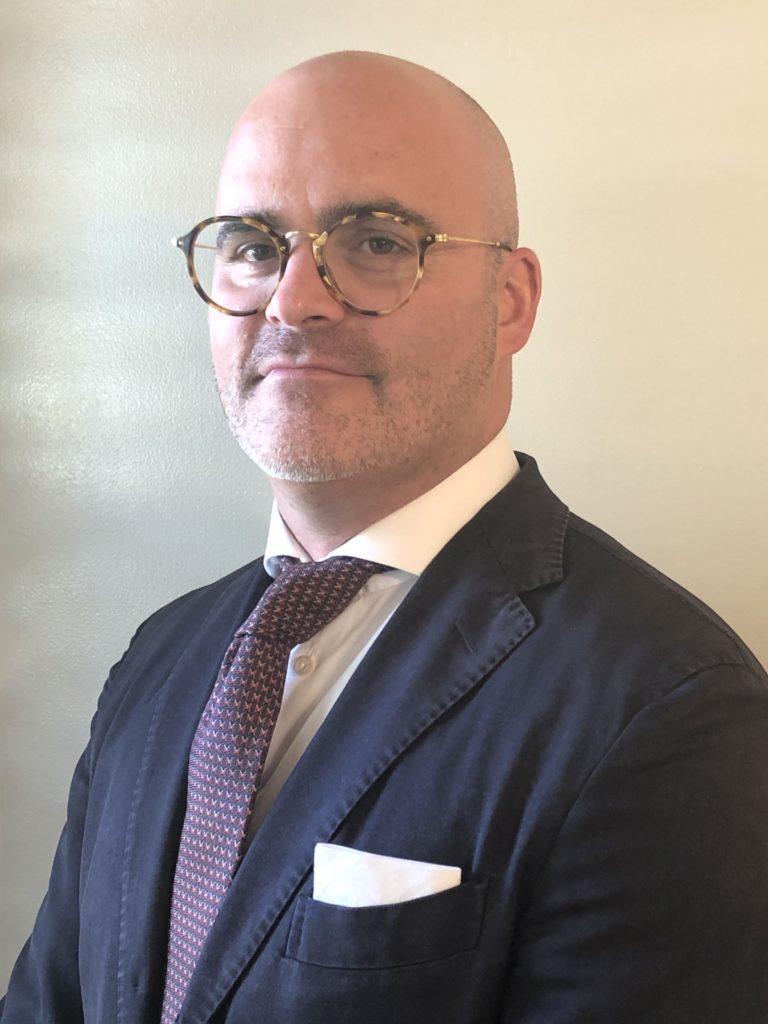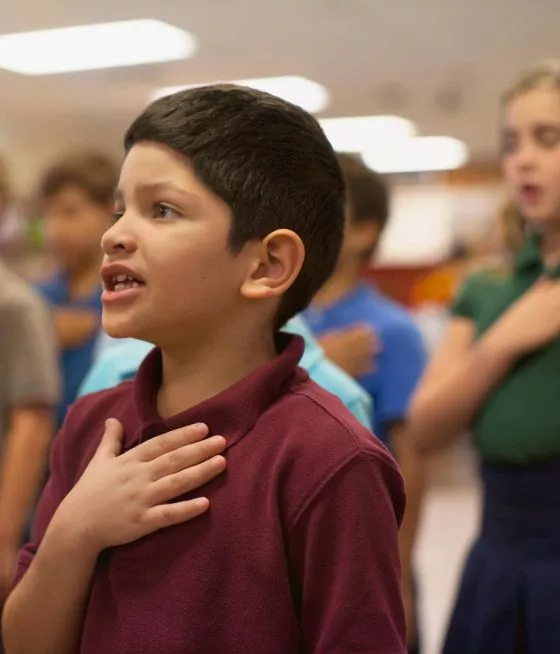
An interview with Carol McNamara and Trevor Shelley
JMC Resident Historian Elliott Drago sat down with JMC Scholars Carol McNamara and Trevor Shelley to interview them about their latest book, Renewing America’s Civic Compact. Dr. McNamara is Director of the Great Hearts Institute for Classical Education. Dr. Shelley is Associate Director of Graduate Studies and Assistant Teaching Professor at Arizona State University’s School of Civic and Economic Thought and Leadership.
Restoring civic friendship
ED: What inspired you two to become scholars?
CM/TS: For both of us, it was great teachers who introduced us to the great texts and stories that raise the questions, the pursuit of which, if not the answers, make one a student of the human things. First and foremost we are teachers who study texts and questions together with friends and students, and our scholarship is in the service of our teaching and desire to understand better the Western and American traditions.
ED: Briefly tell us the main arguments and themes of your book, Renewing America’s Civic Compact.
CM/TS: Our book is a volume of collected essays by scholars and public intellectuals among whom are conservatives and liberals, all of whom share a deep regard for the importance of the American experiment, as well as genuine concern for the present state of American political and social life.
The volume opens with essays diagnosing the contemporary “American malady” of civic life and is followed by a series of topical pieces analyzing particular challenges and responses. It closes with essays on civic friendship, the restoration of which is deemed crucial for the American project to persist and recover some semblance of mutual understanding and respect. As Paul Ludwig compellingly argues in the final essay, modern political scientists lack a robust theory of civic friendship, but among contemporary Americans, its practice is by no means absent; scholars could improve the practice through empirical study and theorizing, but it is as much a task for all of us to work to ennoble relations with our fellow citizens. We should not be surprised to learn, as Michael Pakaluk writes, that “reciprocity was an important ideal for the Framers and is a mark of constitutional provisions and concerns, such as comity among states, interstate commerce, and elections of representatives who hold office in trust for public service.” There is a deep well of wisdom—from both theory and practice—upon which we can draw in our thoughtful efforts at restoration today.
As we write in our “Introduction,” while there is a growing sense of despair in certain sectors of American culture—some suggesting that the constitutional order is beyond repair— we do not share such a dire perspective. We argue, “These pessimistic viewpoints all fail to move us beyond a zero-sum political game and forget that the purpose of America’s experiment in self-government is to afford citizens and statesmen the opportunity to direct their common fate by prudential constitutional means.” We, and our contributing authors, do not believe that things will just work themselves out, or that there are grounds for simple optimism. Far from it; the work before us is great, and includes identifying clearly what troubles us. The book argues that to rebuild trust in the legitimacy of our institutions, we must restore a genuine understanding of and appreciation for self-government, American citizenship, thoughtful statesmanship, and constitutional thinking.
ED: Describe how higher education can be viewed as both the problem and the solution to revitalize civics.
The role and importance of higher education—including both classical liberal and civic education—is a thread running throughout nearly all of the volume’s essays.

CM/TS: Most of the authors are themselves educators and have firsthand experience of the decline and corruption of the mission of our universities, in terms of institutional principles and the quality, as well as the content, of education on offer. Insofar as much of contemporary education, especially higher education, adopts an anti-American ideological lens and fails to educate future citizens about the regime’s founding and constitutional principles and history, future citizens are increasingly likely to be both ignorant and hostile to the American project. The implications go beyond domestic concerns, for as H.R. McMaster’s essay underlines, ignorance, and hostility are sapping American confidence and diminishing our strategic competence in foreign policy and national security. The condition and self-understanding of the university need to change. That education is a political question is an insight as old as political philosophy itself.
Classical liberal education plays a crucial role in forming and shaping future citizens, who will in turn be voters and possible legislators, learning to live and act in ways supportive of American democratic life.
ED: Reforming higher education is a gargantuan task. What practical recommendations do you make to begin that process?
CM/TS: The education reform movement is underway. At both the K-12 and post-secondary levels, various charter, classical, and religious schools are increasing in number and enrollments, while certain new schools of civic thought are starting up at public universities. So, there is some hope, but much work is yet to do.
Reforming education always requires a long-term strategy.

CM/TS: That said, a few key measures to this end include: resetting curricula around primary texts and great books that teach students to read, think, and converse thoughtfully about the pursuit of knowledge; structuring courses around great debates so students come to appreciate the important questions and different views of the various parties; and cultivating the practice of civil disagreement and dialogue among individuals of different perspectives. What is more, both academics and administrators at universities must stand in defense of intellectual diversity and academic freedom. Doing so would encourage reasoned argument about any number of topics, including some of the predominant ideologies now manifest on campuses, such as Diversity, Equity, and Inclusion, which often militates against freedom of speech and expression. These ideological impositions have corrupted the American meritocratic ethos. Rita Koganzon’s essay nicely highlights the inescapability of meritocracy in democracy and the ways in which its logic is bound up with higher education in America, not least given the preoccupation with a handful of elite schools. She prudently suggests, “Our aim should be to shake off higher education’s credentialing monopoly, without shaking off higher education.” Thus, those interested in reform may look to some unassuming places and lesser-known schools for emerging examples of thoughtful leaders and programs charting the way forward.
ED: Explain some of the dangers inherent in believing that “liberal democracy is on life support or already failed.”
CM/TS: An overly pessimistic view of the current state of affairs risks falling into despair—a state of belief that nothing can be done, or that one is utterly helpless, and all hope is lost. Such a disposition is altogether antithetical to the very spirit that founded the American republic, which was born of an understanding of and appreciation for human action in pursuit of liberty and greatness.
Self-government requires individuals who understand fully that America’s constitutional principles are the bedrock of our free society and that we have a responsibility to improve our common life together.
CM/TS: Some of the most important work necessary to rebuild liberal democracy rests on reviving face-to-face relations at the most local and immediate levels. Restoration of stable institutions requires stepping away from excessive social media interactions and online echo chambers, and not focusing exclusively on national politics. For those all too eager to dispense with liberalism, as Michael Zuckert writes, “we should abide by the likely advice of Locke the medical doctor: be careful not to throw the baby out with the bath water.” C. Bradley Thompson’s essay provides a good place to start to recall the moral ideas and principles inherent in the liberalism of America’s revolutionary generation; he compellingly demonstrates that their virtues may yet be ours. Thompson’s insight is true regardless of whether one considers oneself liberal or conservative today, for as Daniel Mahoney argues, “We have no choice but to bet on the possibility that old-fashioned patriots can renew a conservative wisdom open to the best of the old liberalism, and a liberalism open to conservative wisdom reminding it of long-forgotten truths.”
ED: How can we support educators and students who confront, and perhaps support, that thinking daily?
CM/TS: A longer and richer time horizon can be remedial, not least by deepening one’s understanding and appreciation of difficult and challenging times in America’s own past. The American regime has met crisis before and has found within itself, as well as in resources beyond it, the spirit and will to persevere and confront what troubled and ailed it–and can do so again.
A rare and remarkable experiment
ED: What has your scholarship taught you about America’s founding principles and history?
CM/TS: Properly understood, the American project is a rare and remarkable experiment in human and political affairs. For all her faults—no regime of human beings in history is perfect, or ever will be—America is a nation of which its citizens can and should be proud. Studying America’s founding principles and history allows one to raise many of the fundamental questions of political philosophy, enter into debates on the pressing moral matters that bedevil human affairs, and encounter the greatness of citizens and leaders whose intellectual and moral virtues have informed the American regime.

What is your next project?
CM/TS: Trevor is currently working on a manuscript engaging the thoughts of Adam Smith and Alexis de Tocqueville and is also engaged in a co-authored project on the political implications of “the metaverse” or virtual reality with Eric Schmidt of Kentucky Wesleyan College. Carol is currently working on an essay, “Banning Shylock,” on Shakespeare’s The Merchant of Venice, a sadly timely topic, and then will turn her attention to finishing a book project on the prescient thought of Tom Wolfe.
What’s one thing you wish everyone knew about the American political tradition?
CM/TS: Perhaps the most fundamentally important lesson American students in particular, and perhaps many of their professors, need to recall is that the United States is an experiment in pluralism and self-government. Alexander Hamilton’s observation in The Federalist Papers that “it seems to have been reserved to the people of this country, by their conduct and example, to decide the important question, whether societies of men are really capable or not, of establishing good government from reflection and choice, or whether they are forever destined to depend, for their political constitutions, on accident and force,” remains true to this day. The project, though almost 250 years along, is still young and more fragile than many imagine.
We all should continue to value the American capacity for self-criticism and correction, but perhaps we should exercise greater patience as we learn to live together under a government explicitly dedicated to securing for all of us – still imperfectly – the unalienable rights to “life, liberty, and the pursuit of happiness,” for the first time in human history.
The demand for a perfect government, and for perfectly just human beings seems immoderate when what we sought from the beginning was a more perfect Union—the emphasis being always and ever on working toward improvement but never reaching its terminus. In “Renewing America’s Civic Compact,” Diana Schaub reminds us that because Frederick Douglass had a “grateful temperament,” his “activism never descended into the politics of grievance and victimology.” We ought to remember that our constitutional project is still a work in progress and that we should be grateful for the success of America’s still fragile experiment.
ED: Fascinating insights, thank you for your time!
Elliott Drago serves as the JMC’s Resident Historian and Editorial Manager. He is a historian of American history and the author of Street Diplomacy: The Politics of Slavery and Freedom in Philadelphia, 1820-1850 (Johns-Hopkins University Press, 2022).
